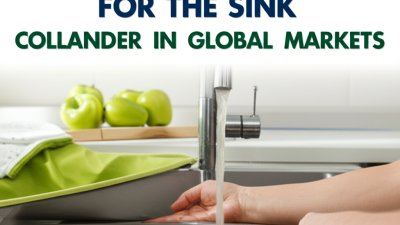Welcome to this website!

 As the global demand for kitchenware continues to soar, the sink colander has emerged as an essential tool in households around the world, contributing significantly to the functional aesthetics of modern kitchens. According to the Global Kitchenware Market Report 2023, the market for colanders is projected to reach $2.5 billion by 2025, demonstrating a compound annual growth rate (CAGR) of 6.5%.
As the global demand for kitchenware continues to soar, the sink colander has emerged as an essential tool in households around the world, contributing significantly to the functional aesthetics of modern kitchens. According to the Global Kitchenware Market Report 2023, the market for colanders is projected to reach $2.5 billion by 2025, demonstrating a compound annual growth rate (CAGR) of 6.5%.
Chinese manufacturers have established a reputation for producing durable and reliable sink colanders, embodying the motto "Globally Trusted Chinese Manufacturing with Consistent Quality." However, navigating the complex landscape of export certification can be challenging, requiring a thorough understanding of international standards and regulations. In this blog, we will explore the intricacies of export certification for sink colanders, offering insights and strategies to successfully penetrate global markets while ensuring compliance and quality assurance.
When it comes to exporting sink colanders, understanding the key requirements for export certification is essential. Compliance with international standards not only facilitates smoother transactions but also ensures that products meet safety and quality benchmarks recognized across global markets. According to a 2021 report by the International Trade Centre, products that adhere to certification requirements have 30% higher success rates in market penetration. This underscores the importance of obtaining the necessary certifications tailored to specific destinations.
Tip: Before initiating the export process, familiarize yourself with the certification standards of your target market. Common certifications include ISO 9001 for quality management systems and CE marking for European markets, which confirm that your product meets necessary regulatory requirements.
Documentation is another critical aspect of export certification. Proper labeling and the provision of safety data sheets are mandatory for many countries, as highlighted by the global export compliance report published by the World Trade Organization in 2022. Ensuring all documents are in order can prevent costly delays and rejections at customs.
Tip: Always stay updated with any changes in regulations, since non-compliance can lead to significant penalties. Subscribing to industry newsletters and participating in trade-related workshops can keep you informed about evolving export certification requirements.
Navigating the complex landscape of export regulations is vital for companies looking to penetrate global markets with sink colanders. Each country has its own set of guidelines that can significantly impact the export process. For instance, according to a recent report by Market Research Future, the global kitchenware market, which includes products like sink colanders, is projected to grow at a CAGR of 5.3% from 2021 to 2027. This growth underscores the importance of understanding country-specific regulations to maximize market opportunities.
In the European Union, sink colanders must meet stringent safety and environmental standards, including compliance with the Registration, Evaluation, Authorisation and Restriction of Chemicals (REACH) regulation. Meanwhile, markets like Japan require that products not only pass inspections but also be certified by entities like the Japanese Industrial Standards (JIS). Failure to meet these regulations can result in hefty fines or a ban on importing goods. Therefore, it is essential for exporters to conduct thorough research and potentially consult with legal experts specializing in international trade to navigate these varying regulations successfully.
Navigating the complexities of export certification can be a daunting task for businesses looking to thrive in global markets. One common hurdle faced by exporters is the imposition of non-tariff barriers (NTBs), as highlighted in recent discussions involving India and Russia. Exporters must not only adhere to compliance regulations but also anticipate and address challenges that arise due to differing standards and certifications required in various markets.
To overcome these barriers, exporters should prioritize a thorough understanding of the certification requirements specific to their target countries. Collaborating with local authorities and leveraging resources from international trade organizations can provide essential insights. Additionally, creating strategic partnerships with experienced exporters in the same market can offer valuable guidance and share best practices. As demonstrated in the agricultural sector's discussions in Bangladesh, acknowledging and addressing structural and management challenges can significantly enhance competitiveness.
Moreover, diversifying export destinations is crucial in mitigating risks, especially in volatile markets. By adopting innovative practices and forming strong collaborations, exporters can navigate certification challenges more effectively, ensuring sustainable growth in global markets.
When entering the global market with products like sink colanders, navigating export certification can be a complex process. Streamlining this certification involves understanding regulatory requirements across different regions. According to a 2022 survey by the International Trade Administration, nearly 60% of companies cited regulatory compliance as a major barrier to market entry. To mitigate this, manufacturers should consider engaging with a local compliance expert who can provide insights into specific regional regulations, such as the FDA requirements in the U.S. or CE marking in Europe.
Moreover, adopting a proactive approach to documentation can significantly expedite the certification process. The World Bank's "Doing Business" report indicates that companies that prepare comprehensive documentation in advance see a 30% reduction in processing times. This can include having detailed product specifications, quality assurance records, and lab testing results readily available. By prioritizing these aspects, businesses not only enhance their approach to compliance but also position themselves favorably against competitors in the global market.
When it comes to exporting sink colanders, quality assurance plays a pivotal role in ensuring that products meet international standards. Buyers in global markets are increasingly concerned about the durability, functionality, and safety of kitchen products. Therefore, rigorously implementing quality assurance processes is essential for manufacturers.
This involves conducting regular inspections at every stage of production, from raw material selection to the final product, to ensure that the colanders are not only aesthetically pleasing but also compliant with regulations governing kitchenware.
Moreover, obtaining the necessary export certifications can streamline entry into diverse markets. Quality assurance helps manufacturers identify potential issues early, minimizing the risk of non-compliance. By adhering to international standards such as ISO certifications or those set by specific countries, producers can bolster their credibility and enhance customer trust. This not only facilitates a smoother export process but also positions the sink colander as a reliable choice for consumers globally, ultimately leading to greater market opportunities and increased sales.
